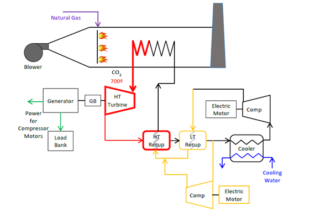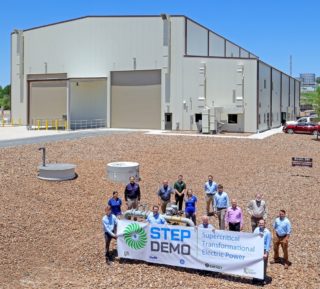-
CSIRO joins supercritical CO2 ‘STEP Demo’
Date posted:
-
-
-
Post Author
Greg Kelsall
-
-
![]()
Figure: Recompression closed Brayton cycle (RCBC)
The Commonwealth Scientific and Industrial Research Organisation (CSIRO), Australia’s national science research agency, has recently joined the Joint Industry Partnership (JIP) of the Supercritical Transformational Electric Power (STEP) project known as ‘STEP Demo’.
STEP Demo seeks to demonstrate power generation plants enabled by supercritical carbon dioxide (sCO2) technology that can offer improved efficiencies, economics and environmental performance. The sCO2 concept was described in a recent IFRF Blogpost looking at Siemens’ activities in this area. The aim is that by the end of this six-year STEP pilot demo project, the operability of the sCO2 power cycle will be demonstrated, starting with facility commissioning as a simple closed recuperated cycle configuration initially operating at a 500°C (932°F) turbine inlet temperature and progressing to a recompression closed Brayton cycle technology (RCBC) configuration operating at 715°C (1319 °F), as shown in the figure above.
CSIRO’s contributions will improve the understanding of how sCO2 power plants can enable lower- and zero-emission technology solutions, and how those plants might be used in remote mining and community locations as a low-cost alternative to diesel gensets for power generation.
With $84m funding from the US DOE/National Energy Technology Laboratory, GTI is leading the STEP Demo project team in collaboration with Southwest Research Institute (SwRI) and GE Research. The pilot plant has been designed, building construction has been completed and equipment installation is underway on the SwRI campus in San Antonio, Texas, with first operation expected in 2021.
![]()
This first-of-a-kind 10MWe sCO2 pilot plant will demonstrate a fully-integrated, functional power cycle in a test facility, configured to enable optimisation of system performance and characterisation of critical components and subsystems. When completed, it will be the largest sCO2 demonstration facility of its kind in the world, and will represent a significant step toward technology commercialisation.
The STEP Demo pilot plant will be used to advance the sCO2 Brayton power cycle and demonstrate performance over a range of operating conditions. A Brayton cycle circulates heated working fluid and compresses it, which spins a generator that creates electricity. Using sCO2 as a power cycle working fluid – instead of steam/water – will lower capital expenditure and reduce plant size and footprint.
As Australia’s national science agency, CSIRO undertakes a wide range of research, development and demonstration activities in sectors such as energy, mineral resources, land/water and manufacturing, that are directly related to the application of advanced sCO2 power plants. Many of CSIRO’s activities are undertaken in collaboration with industry, which also provides potential commercial uptake pathways for sCO2 power plants.
The Australian Solar Thermal Research Institute (ASTRI) and Graphite Energy (a developer of modular graphite-based thermal energy storage) are part of CSIRO’s team, highlighting the importance that the country places on end-use applications and the desire to assess how sCO2 power plants can be embedded within Australia’s future on- and off-grid connected power systems.


